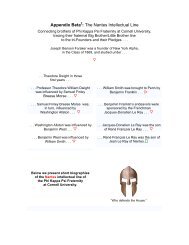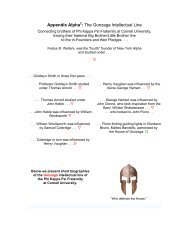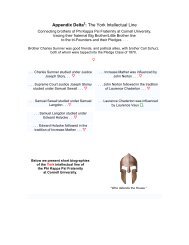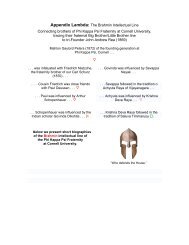Gondar - Phi Kappa Psi
Gondar - Phi Kappa Psi
Gondar - Phi Kappa Psi
Create successful ePaper yourself
Turn your PDF publications into a flip-book with our unique Google optimized e-Paper software.
He received the sacraments weekly, and twice a week in the Advent<br />
season and during Lent. Whenever possible he took part in public devotions,<br />
processions, and the pilgrimages; thus in 1585 he went on a pilgrimage to Loreto<br />
and Rome. His court was jestingly called a monastery, and his capital the<br />
German Rome. He founded several Jesuit monasteries, in particular that of St.<br />
Michael at Munich, and contributed to the missions in China and Japan.<br />
He did everything possible in Bavaria and the German Empire to further<br />
the Catholic Counter-Reformation, and laboured to prevent the spread of<br />
Protestantism. Thus it was largely through his efforts that the Archbishopric of<br />
Cologne did not become Protestant, due mainly to the vigorous support he gave<br />
his brother Ernst, who had been elected archbishop against Gebhard Truchsess.<br />
On the other hand, the manner in which he bestowed benefices upon<br />
members of his family makes an unpleasant impression at the present day,<br />
though, at that time, this was not considered so unseemly. In the end his brother<br />
Ernest had, besides other benefices, five dioceses, and Wilhelm's son Ferdinand<br />
was bishop of an equal number; another son intended for the clerical life, <strong>Phi</strong>lip,<br />
was made Bishop of Ratisbon in 1595 and cardinal in 1596, but died in 1598.<br />
Wilhelm had his eldest son Maximilian educated with much care, and in 1597 he<br />
resigned the government to Maximilian and led a retired life, devoted to works of<br />
piety, asceticism, and charity, and also to the placid enjoyment of his collections<br />
of works of art and curiosities.<br />
The house of Wittelsbach in the years before William the Vth reign was<br />
allegedly governed by a series of “compacts”. In spite of the decree of 1506<br />
William IV was compelled in 1516, after a violent quarrel, to grant a share in the<br />
government to his brother Louis X, an arrangement which lasted until the death<br />
of Louis in 1545.<br />
William followed the traditional Wittelsbach policy of opposition to the<br />
Habsburgs until in 1534 he made a treaty at Linz with Ferdinand, king of Hungary<br />
and Bohemia. This link strengthened in 1546, when the emperor Charles V<br />
obtained the help of the duke during the war of the league of Schmalkalden by<br />
promising him in certain eventualities the succession to the Bohemian throne,<br />
and the electoral dignity enjoyed by the count palatine of the Rhine.<br />
William also did much at a critical period to secure Bavaria for<br />
Catholicism. The reformed doctrines had made considerable progress in the<br />
duchy when the duke obtained from the pope extensive rights over the bishoprics<br />
and monasteries, and took measures to repress the reformers, many of whom<br />
were banished; while the Jesuits, whom he invited into the duchy in 1541, made<br />
the university of Ingolstadt their headquarters for Germany. William, whose death<br />
occurred in March 1550, was succeeded by his son Albert V, who had married a<br />
daughter of Ferdinand of Habsburg, afterwards the emperor Ferdinand I. Early in<br />
his reign Albert made some concessions to the reformers, who were still strong in<br />
Bavaria; but about 1563 he changed his attitude, favoured the decrees of the






